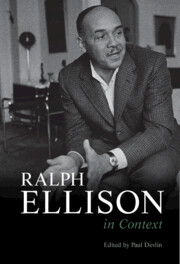Book contents
- Ralph Ellison in Context
- Ralph Ellison in Context
- Copyright page
- Contents
- Figures
- Notes on Contributors
- Abbreviations
- Introduction
- Part I Geographical, Institutional, and Interpersonal Contexts
- Part II Historical, Political, and Cultural Contexts
- Part III Literary and Critical Contexts
- Chapter 20 The Harlem Renaissance
- Chapter 21 Ellison’s Early Writings
- Chapter 22 The Wright School
- Chapter 23 Literary Modernism
- Chapter 24 Beyond Raglan’s Hero: Ellison’s Ritualist Influences
- Chapter 25 Sociology
- Chapter 26 The Soapbox Speech in Ellison’s Fiction
- Chapter 27 Postwar Literary Aesthetics
- Chapter 28 Ellison as Correspondent
- Part IV Reception and Reputation
- Index
Chapter 20 - The Harlem Renaissance
from Part III - Literary and Critical Contexts
Published online by Cambridge University Press: 14 January 2022
- Ralph Ellison in Context
- Ralph Ellison in Context
- Copyright page
- Contents
- Figures
- Notes on Contributors
- Abbreviations
- Introduction
- Part I Geographical, Institutional, and Interpersonal Contexts
- Part II Historical, Political, and Cultural Contexts
- Part III Literary and Critical Contexts
- Chapter 20 The Harlem Renaissance
- Chapter 21 Ellison’s Early Writings
- Chapter 22 The Wright School
- Chapter 23 Literary Modernism
- Chapter 24 Beyond Raglan’s Hero: Ellison’s Ritualist Influences
- Chapter 25 Sociology
- Chapter 26 The Soapbox Speech in Ellison’s Fiction
- Chapter 27 Postwar Literary Aesthetics
- Chapter 28 Ellison as Correspondent
- Part IV Reception and Reputation
- Index
Summary
This chapter considers Ellison’s contradictory relationship to the black writers of the Harlem Renaissance of the 1920s and 30s. While Ellison met and conversed with Alain Locke about black writing as an undergraduate at Tuskegee, and benefitted directly from mentoring by African American creative forebears like Langston Hughes and Richard Wright after his move to New York in the late 1930s, he also expressly distanced himself from these figures later. In chapters like 1963-64’s canonical “The World and the Jug,” for example, Ellison emphasizes the influence of various white modernists like T.S. Eliot, Ernest Hemingway, and André Malraux as he downplays his debt to Hughes and Wright, both of whom bookended the politicized aesthetic of the Renaissance. As a counterpoint, I consider Ellison stylistic points of resemblance with these earlier black modernists to suggest a more substantial genealogical connection than Ellison himself admitted at times in his own rhetorical self-fashioning.
Keywords
- Type
- Chapter
- Information
- Ralph Ellison in Context , pp. 219 - 229Publisher: Cambridge University PressPrint publication year: 2021

